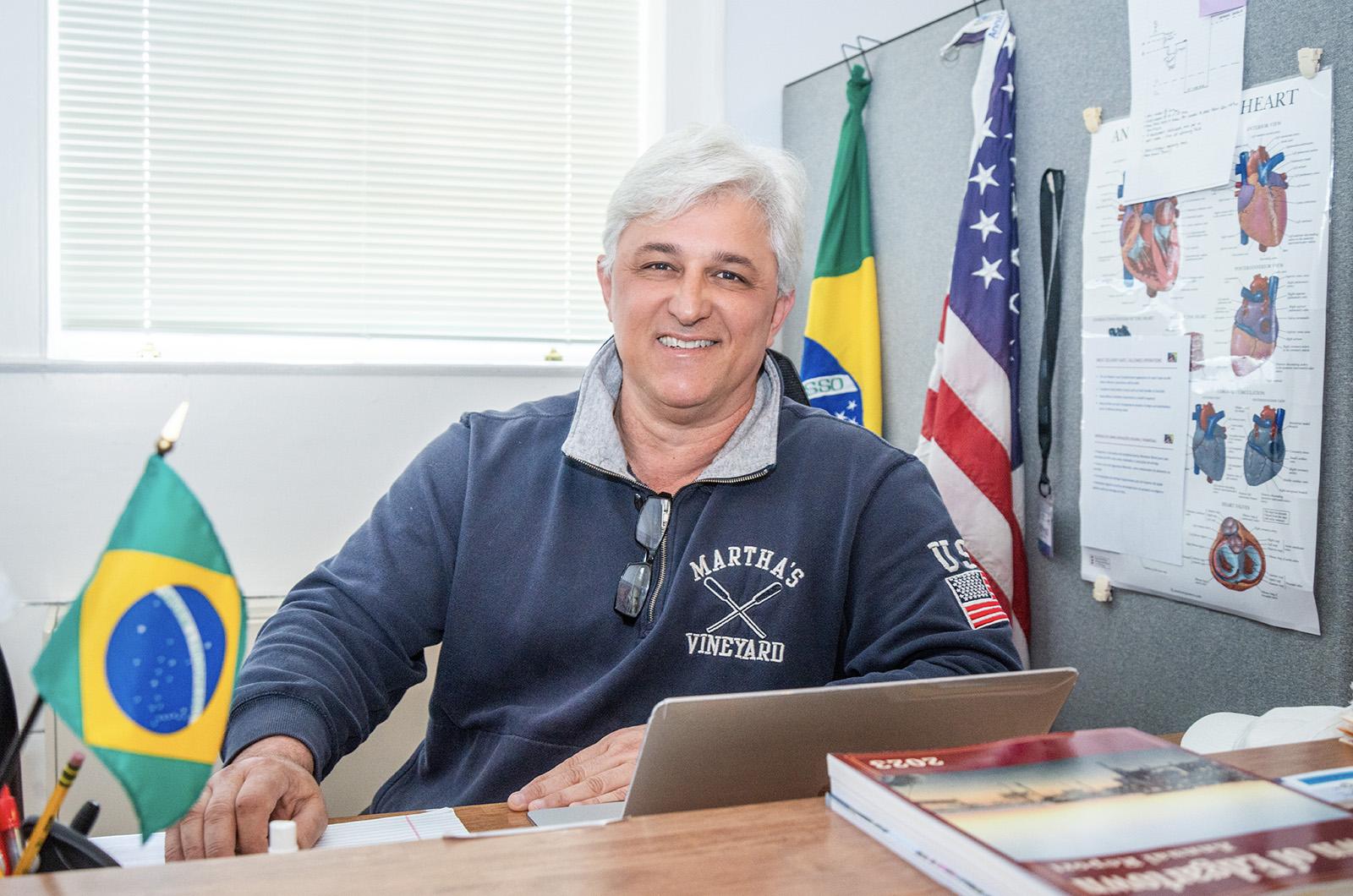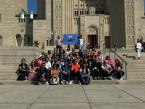Public health information has been difficult to access for the growing non-English speaking population on Martha’s Vineyard. Fernando Lana, the Dukes County public health educator, is working to make it easier to access for the Brazilian community.
For the past four years, Mr. Lana has been providing Portuguese translation and interpreting services for an array of public health concerns in an attempt to bridge the gap between the largely English speaking public health system on the Island and sizable population of Brazilian-Portuguese speakers.
In his current role, he’s provided the Brazilian community with information on tick-borne illnesses, dental issues and even the proper fertilizers to use for lawns. Marina Lent, the Aquinnah health agent, said it’s been a big change for the Vineyard.
“Before Fernando was doing it . . . it was very minimal,” said Ms. Lent, Mr. Lana’s direct supervisor. “He’s created a Brazilian arm of public health, both services and inspections.”
Though not classically trained in public health, Mr. Lana started working with the Island’s boards of health as a volunteer during the Covid-19 pandemic. He was hired to work full time last year as the Dukes County public health educator. He is also an inspector.
“I began doing contact tracing and helping with whatever communication that the Brazilian community needed,” Mr Lana said. “And that’s how it all began.”
In addition to inspections and making information available in Portuguese, Mr. Lana has also helped bring food safety courses required in the restaurant industry to the Island in Portuguese.
According to Ms. Lent, the pandemic made the need for language access obvious.
“The pandemic really brought it out to us, that we had to do more than translate flyers,” Ms. Lent said.
Mr. Lana now works with the Inter-Island Public Health Excellence Coalition, which is funded by the state’s Public Health Excellence Shared Services Grant Program, and works to create a system of shared health services across the Island. The coalition was one of the first recipients of the grant and brings together the six boards of health on Martha’s Vineyard.
Mike Hugo, the director of strategies and government relations for the Massachusetts Association of Health Boards is in charge of the grant that allows Mr. Lana to work on a wide variety of programs dedicated to public health access.
“Right now, the Island group is considered to be maybe the leading group of all the grant recipient groups,” Mr. Hugo said, “All eyes are on the Island and a lot of it is because of what we’ve done with Fernando.”
Although Mr. Lana is relatively new to public health, he has a long history with languages and also speaks Spanish. He moved to the United States from Minas Gerais, Brazil when he was 19 years old. He later moved back to Brazil, where he taught English for 10 years.
“I didn’t know I could be a teacher,” he said. “I actually spoke with the owner of a teaching company in Brazil, and she was very interested in my profile and she said let’s work together. So we worked together for five years. I found out that it can be a fascinating experience, and I did it for 15 years of my life.”
Mr. Lana then moved to Mexico, where he taught English as a second language at the University of Guadalajara. While living in Mexico, he also worked in international business sales. Later, he began working in the caregiving industry and moved to Martha’s Vineyard to work with a client, Thomas Mullins, who died in 2020.
His time as a teacher prepared him for responding to the Covid-19 pandemic.
“I had gone through the H1N1 pandemic in Mexico as an English teacher, so when Covid happened . . . I applied what I had learned,” he said, “The first thing that came to my mind was how important it was for us to have a steady source of communication, and a reliable one.”
In addition to contact tracing, Mr. Lana worked with the boards of health to translate information provided by Maura Valley, the former Tisbury health agent who became the Island’s public health spokesperson during the pandemic. He would translate the information into Portuguese and post it on social media.
He continues to use social media in his current role, including the Facebook page for Martha’s Vineyard boards of health and Brazukada, a Facebook group for the Brazilian community on the Island.
“That’s how the public health educator vision came about,” Mr. Lana said. “I already established a good channel of communication within the Brazilian community, so that made it a lot easier to touch up on other important subjects.”
As a translator, he makes the written word available to a wider audience. He also provides language access in real time as an interpreter.
“One of the other things that I’ve been doing is helping dentists around the Island with interpreting for the Brazilian community,” Mr. Lana said. “Otherwise, they have to end up outsourcing or sending people off-Island when they’re not able to speak English here.”
He said that communication in pediatric dentistry is an area that particularly needs improvement.
“[Children] are still learning how to properly define what they are really feeling,” Mr. Lana said. “When dealing with children, the interpreter needs to be able to observe body language, tone of voice.”
He added that understanding non-verbal cues is a vital aspect of interpretation for any age range.
“You have to be able to understand, for example, that a person from the north of Brazil usually does not speak much . . . . They nod a lot, so you have to be aware of that,” Mr. Lana said.
He also takes note of regional differences to make the people he interprets for feel more at ease.
“If I’m interpreting for somebody whom I know is Mexican, I try to get as close to whatever jargon that they use in Mexico,” Mr. Lana said, “I use different language skills from that particular region with them, so they associate me as one of them. It makes things a lot easier.”
Mr. Lana says that interpreting can be emotionally difficult, but he is happy to help.
“There are traumas . . . I have to say that I caught myself weeping, literally . . . there’s no way as a human being that you’re not able to take that in,” He said about translating when Venezuelan migrants were sent to the Island. “I always try to make their story bigger than my feelings . . . I’m humbled by the opportunity to be someone else’s voice.”







Comments (4)
Comments
Comment policy »